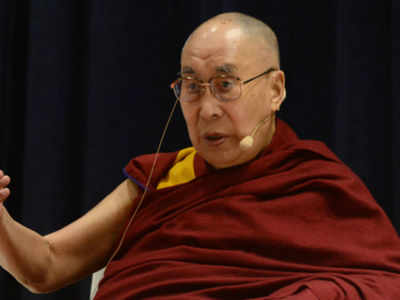- News
- World News
- China News
- Disregard for China's Dalai Lama could affect ties: Beijing
Trending
This story is from July 14, 2019
Disregard for China's Dalai Lama could affect ties: Beijing

File photo
LHASA/BEIJING: Amid concerns internationally over the deteriorating health of the Dalai Lama, Chinese officials have warned that the issue of his reincarnation may adversely impact Sino-Indian ties if India disregards the appointment of the new Dalai Lama by Beijing through the "traditional" process.
The same issue of finding a successor of the 14th Dalai Lama is threatening to turn into another flashpoint in fast deteriorating US-China ties with the former saying that this is a religious issue with no role for the state in it.While India looks at the Dalai Lama as a spiritual figure who isn't allowed to carry out any political activity on Indian soil, it may find it difficult to steer clear of the issue for long as the Tibetan government-in-exile based here is likely to appoint its own Dalai Lama successor.
"This can turn into a major political difference that would affect ties (if India doesn't recognise the Dalai Lama chosen by China). But no wise leader or friendly country will do that. Of course, India can also stay away (and not publicly endorse him). India though should respect China's right to deal with its (internal) social and domestic issues," said Zha Luo, the director of China Tibetology Research Center, the premier Chinese government Tibet policy think tank.
The officials also warned against any attempt to change the status quo in Arunachal Pradesh which China claims as a part of southern Tibet.
As Zha and another official, Xiao Jie, said though, the next Dalai Lama can only be chosen through 2 steps, namely drawing of lots from a golden urn and recognition of the central government. According to China, which apparently wants to appoint the new Dalai Lama to protect Tibetan culture and heritage, the same process to find his successor has been followed since 1792, when the Qing dynasty introduced it to project its control of Tibet.
Similarly, the Lhasa-based director-general of the information office of People's Government of Tibet Autonomous Region, Wang Neng Sheng, said the role of the central government had to be recognised.
"Dalai Lama's personal moves will not be recognised by Chinese government and religious followers in Tibet. It was with central government's recognition that Dalai Lama became the 14th Dalai Lama," he said, adding that Tibetans who had been detained by Nepal while trying to enter India had been misled by the Dalai Lama.
Zha and Xiao also warned that Sino-Indian ties could be affected by any attempt to change the status quo in Arunachal Pradesh, which China claims as a part of southern Tibet.
"If there is a disputed area, according to international law, the 2 governments should sit together and discuss it. It is illegal for one country to change the status quo," said Xiao, while responding to a query about Indian leaders' visit to Arunachal.
The same issue of finding a successor of the 14th Dalai Lama is threatening to turn into another flashpoint in fast deteriorating US-China ties with the former saying that this is a religious issue with no role for the state in it.While India looks at the Dalai Lama as a spiritual figure who isn't allowed to carry out any political activity on Indian soil, it may find it difficult to steer clear of the issue for long as the Tibetan government-in-exile based here is likely to appoint its own Dalai Lama successor.
"This can turn into a major political difference that would affect ties (if India doesn't recognise the Dalai Lama chosen by China). But no wise leader or friendly country will do that. Of course, India can also stay away (and not publicly endorse him). India though should respect China's right to deal with its (internal) social and domestic issues," said Zha Luo, the director of China Tibetology Research Center, the premier Chinese government Tibet policy think tank.
The officials also warned against any attempt to change the status quo in Arunachal Pradesh which China claims as a part of southern Tibet.
The 84-year-old Dalai Lama has himself suggested that his successor could come from among his followers in India.
As Zha and another official, Xiao Jie, said though, the next Dalai Lama can only be chosen through 2 steps, namely drawing of lots from a golden urn and recognition of the central government. According to China, which apparently wants to appoint the new Dalai Lama to protect Tibetan culture and heritage, the same process to find his successor has been followed since 1792, when the Qing dynasty introduced it to project its control of Tibet.
Similarly, the Lhasa-based director-general of the information office of People's Government of Tibet Autonomous Region, Wang Neng Sheng, said the role of the central government had to be recognised.
"Dalai Lama's personal moves will not be recognised by Chinese government and religious followers in Tibet. It was with central government's recognition that Dalai Lama became the 14th Dalai Lama," he said, adding that Tibetans who had been detained by Nepal while trying to enter India had been misled by the Dalai Lama.
Zha and Xiao also warned that Sino-Indian ties could be affected by any attempt to change the status quo in Arunachal Pradesh, which China claims as a part of southern Tibet.
"If there is a disputed area, according to international law, the 2 governments should sit together and discuss it. It is illegal for one country to change the status quo," said Xiao, while responding to a query about Indian leaders' visit to Arunachal.
End of Article
FOLLOW US ON SOCIAL MEDIA










